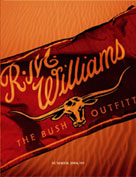R. M. WILLIAMS
The Aussie stock whip
The skills behind a craftsman's product
Story: Don Tilmouth
Photos: Peter Hoar
 The
Australian stockwhip has its origins in the English hunting whip, but since
the beginning of European settlement it has evolved into a form that is almost
unique to this country.
The
Australian stockwhip has its origins in the English hunting whip, but since
the beginning of European settlement it has evolved into a form that is almost
unique to this country.
A major difference is the solid handle, which can be separated from the thong or body of the whip, but when put together as a unit allows the coiled thong to hang easily hooked over a horseman's forearm.
Another differentiation is the use of stranded, vegetable-tanned kangaroo hide - the toughest leather for its light weight in the world.
John Tuchyna, who works in the R.M. Williams craft department, continues the company's the company's long tradition of making fine whips by hand.
Our photos show how R.M. Williams whips are made.
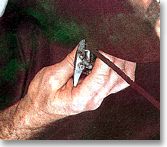 1.To
produce the outside plaiting for a 12 strand, 7 foot (2.1 m) whip, John uses
a tool specially designed by Dene Williams to cut a 5 mm strand continually
around the perimeter of a pre-shaped piece of kangaroo hide.
1.To
produce the outside plaiting for a 12 strand, 7 foot (2.1 m) whip, John uses
a tool specially designed by Dene Williams to cut a 5 mm strand continually
around the perimeter of a pre-shaped piece of kangaroo hide.
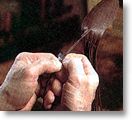 2.John
hangs the leather on a plaiting hook and applies saddle dressing to the strands
so that each one is individually stretched to assure a tight plait. He then
bevels the edges of each strand with the aid of a craft knife blade so that
each edge of the strand will lay "smooth" in the overall plait of the thong.
2.John
hangs the leather on a plaiting hook and applies saddle dressing to the strands
so that each one is individually stretched to assure a tight plait. He then
bevels the edges of each strand with the aid of a craft knife blade so that
each edge of the strand will lay "smooth" in the overall plait of the thong.
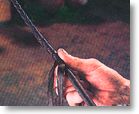 3.John
then makes a four plait belly of 9 mm strands by plaiting over a 1.5 cm centre
length of kip, which is gradually tapered towards the tail. This is followed
by the plaiting of the 12 strand main body of the outside surface of the
whip.
3.John
then makes a four plait belly of 9 mm strands by plaiting over a 1.5 cm centre
length of kip, which is gradually tapered towards the tail. This is followed
by the plaiting of the 12 strand main body of the outside surface of the
whip.
 4.Taking
the unplaited strands of the whip, John uses eight of them to make a series
of loop knots around the end of the thong and the fall. He then pulls the
fall through the small tunnel of loops until the slotted end of the fall
is hard up against the first loop knot.
4.Taking
the unplaited strands of the whip, John uses eight of them to make a series
of loop knots around the end of the thong and the fall. He then pulls the
fall through the small tunnel of loops until the slotted end of the fall
is hard up against the first loop knot.
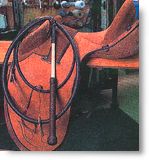 5. The
finished product hangs on the only platform appropriate to such a fine plait
whip - a stock saddle.
5. The
finished product hangs on the only platform appropriate to such a fine plait
whip - a stock saddle.
Story from: Issue 2, December 1998-January 1999
Or visit the R.M. Williams web site


